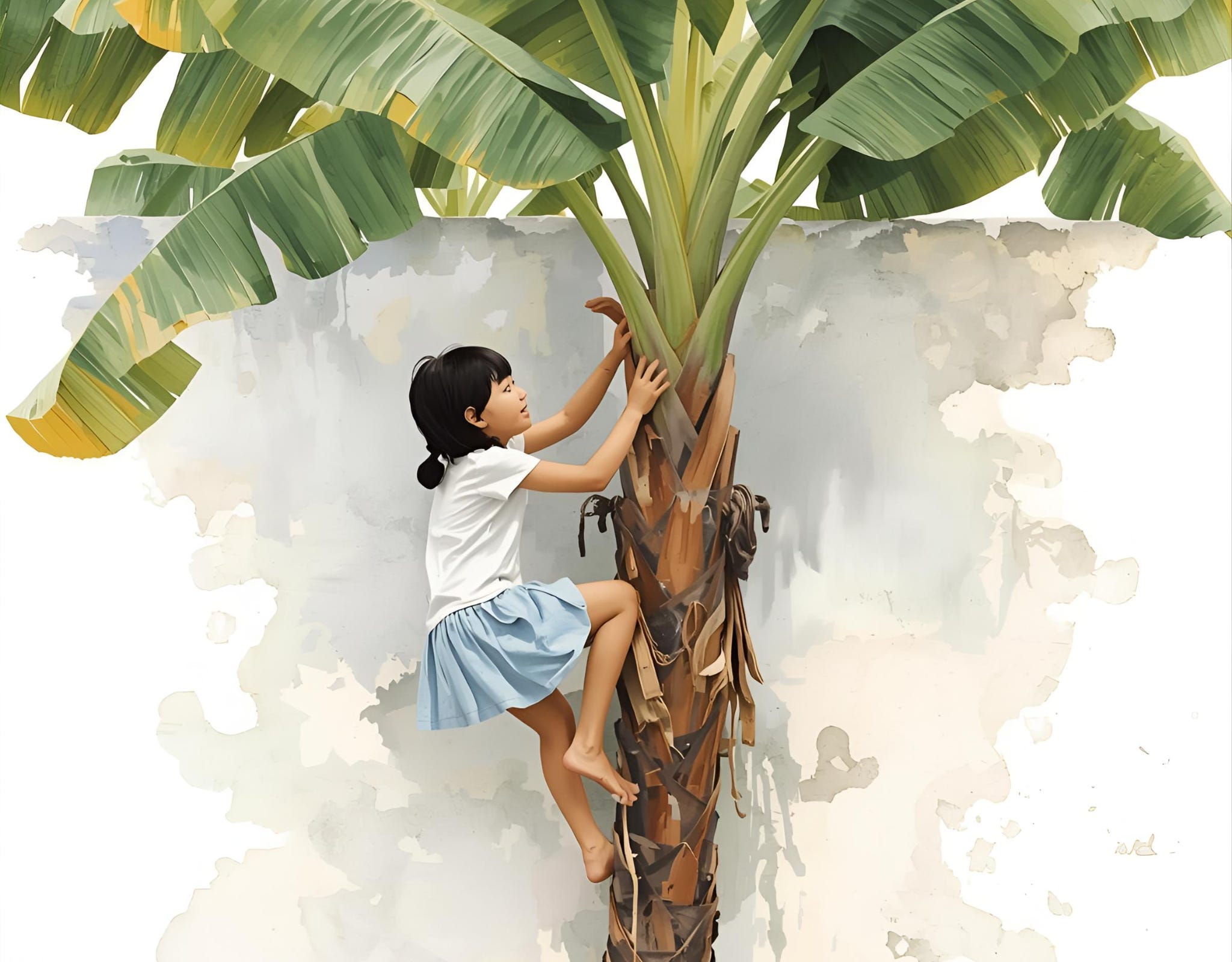Chapter 7: Banana Trees, Barbie Dolls, and Bombs in the Night
Growing up in the spaces where innocence and unrest collide
Some names and identifying details have been changed to protect the privacy of individuals and the integrity of their stories.
“The wound is the place where the Light enters you.” — Rumi
I wake up lingering in the quiet, staring into the darkness of the room, even though it must be morning. The house is quiet as I tuck deeper under the covers, allowing the quiet to swallow my thoughts.
My key on a gold chain is no longer my life. At last, we are with my father and brother in Lagos, where the heat wraps itself around me like an embrace I’ve been missing, and the air is heavy with hibiscus. I run wide-eyed into the green ocean of a yard, lizards darting like silver tongues through the grass, pressing my face into the flowers, the yellow dust painting my nose, as I search for the sweetness hiding deep inside. With one quick slurp, the nectar slips down my throat, as if the whole country had been waiting in that flower to welcome me home. For the first time in a long while, the world feels wide and safe, the sky and sun opening their arms to me.
Indoors, the marble floors cool my feet as I scatter from the living room to the dining room, my brother chasing, his giggling catching at my heels. I’ve learned the table is my shield, its circle of wood giving me just enough distance from legs that run faster than mine.
When we first move into this ground-floor flat, he and I share a bedroom, two small bodies in the dark, breathing into the same silence, sharing secrets like best friends. Then, like a mallet slamming down onto raw meat, her decision came, heavy, unavoidable, and studded like small teeth, leaving their mark long after the strike. “You are getting too old,” she says, the woman who birthed me. And suddenly we are two halves of the same cut, staring at each other across the pounding silence she left behind.
One day, the boxes are gone from the room beside the Jack-and-Jill bathroom. In their place is a bed draped in pink ruffles and a dresser smelling of new wood. Then came Barbie, her house snapping open in my hands, plastic walls blooming into a kitchen, stairs spiraling toward a bedroom that no one would ever sleep in. I try to like her blonde hair and perfectly shaped figure. I do.
We don’t know what to do with her, the plastic bombshell longed for by many young girls. Karl brings his GI Joe to my room, and together we sit cross-legged on the cool floor, our dolls knocking against each other like strangers at a train station. We play pretend sometimes way past dinner, as the outside breaks open with bombs, the sound folding into our plastic laughter clashing with the weight of a country that refuses to be a toy.
Then the pool appears in the backyard, rising out of the grass like a giant bowl, its blue skin trembling in the wind. I climb the short ladder, standing at the edge, staring into water that shimmers like glass about to break. They tell me I will learn to swim, but all I see is the sky turned upside down.
Soon, Karl and I are swept up in after-school rituals of Girl Scouts, Boy Scouts, the stiff keys of a piano under my fingers, my voice pushing into scales, and ice cream melting after dinner. My mother, unable to find anything remotely Asian, even rice, begins to host vibrant parties with Nigerian highlife music, flour sprinkled on the cool marble so that women, dressed in their traditional attire, can move smoothly across the floor as the quick drumbeats keep them jumping.
These parties occur far more frequently as the highlife music spills through the walls and dancers move through the room as alcohol flows into the night, thick with smoke and music, until Karl is found spinning in the hallway like a breakdancer, laughter spilling from his mouth just as my father opens the door into his forehead.
Oops.
And still he continues to giggle.
The next day comes, the sun carrying on, relentless, pressing its gold against our skin. In Nigeria, servants are always men, always with a name of the week, like Monday or Sunday, but never Wednesday. And ours moves softly through the house, sweeping the marble floors we dirty, cooking meals that fill the air with warmth we do not earn. At night, he returns to his small room behind the white cement wall, where his goat stew simmers over a flame, steam curling like prayer.
He is kind to Karl and me, always. After dinner, he calls us over, letting us dip our small fingers into the fufu, which is warm, pliant, and rolled into soft balls before we sink them into the spicy, goat stew. We bend low over the bowl, careful not to spill on our clothes, laughter trembling at the corners of our mouths as the spice and sweetness gather on our tongues, flavors we want to last forever.
On weekends, Dad coaxes us toward the pool. He clutches the back of my suit as I kick along the edge, paddling like a dog, his hand steady and guiding. I never ask why it matters so much to him, learning to move through water without sinking. I only know the warmth of his voice above me, the way his nearness feels like someone wanting more for me than life itself, and that is enough, more than enough.
And until the day he takes his last breath, it is always enough.
Keep reading with a 7-day free trial
Subscribe to The Thread Between Worlds to keep reading this post and get 7 days of free access to the full post archives.

